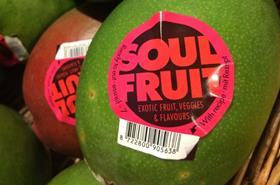
Univeg has launched a new brand aimed at retail customers looking to achieve additional sales in the fresh produce department via the exotic fruit and vegetable category, Eurofruit can reveal.
Soul Fruit, which is being applied to products sourced from existing suppliers, has been trialled in a small number of Rewe supermarkets in Germany over the past few months and will be rolled out to a number of European markets in due course, with Univeg preparing to offer the brand under exclusive license to one retailer per country.
In Germany, where the supplier is working with Rewe to develop Soul Fruit, the range is expected to evolve from a mainly exotic fruit line – including items such as avocados, limes and mangoes – to become a label for exotic fruit, vegetables and even cooking ingredients such as chillies, lemongrass and ginger.
The next likely market for Soul Fruit is the Netherlands, suggests Tamara Landzaat, sales manager at Univeg Trade Benelux, which is co-ordinating the brand’s commercial development.
“Slowly but surely we’re taking this to other markets,” she explains. “We see very good potential in the exotics category. With the right communication, we believe Soul Fruit can go a long way. it’s a young brand, but not too young. It has a certain rhythm, a certain engagement with consumers.
“I see it above all as a brand that will move produce through a retail department throughout the year, because different products will come in at different times. That seasonality makes it a particularly dynamic brand.”
By providing shoppers with plenty of information, Univeg is aiming to create more regular demand for items that might otherwise tend to be overlooked in stores.
In particular, the company wants to tell consumers about the products’ provenance, supplier, quality, availability, taste and potential use. To that end, a new educational website is currently in development.
“In northern Europe, most exotic fresh produce is relatively high in price compared with the more conventional lines and so it requires the consumer to take a certain step and buy it, especially if they don’t know the product itself,” says Landzaat. “By using a brand like Soul Fruit to make it appear more accessible, we’re aiming to make it a bit easier for consumers.”
When it comes to expanding into other markets, she adds, Soul Fruit’s success will depend in part on the kind of demand and preferences seen in each individual country. “For example, German demand can be very different to other markets. We will talk to our sister companies and ask them what they think the demand will be like where they are.”



